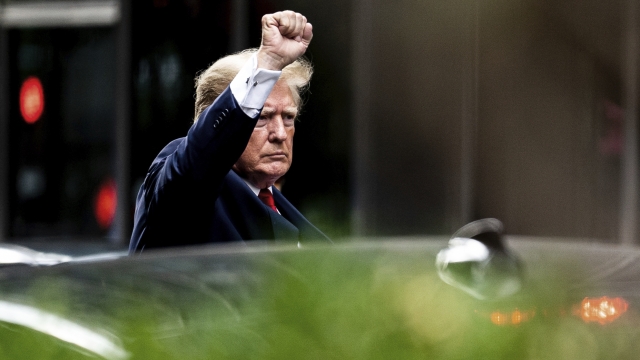Former President Donald Trump invoked his Fifth Amendment protection against self-incrimination as he testified under oath Wednesday in the New York attorney general's long-running civil investigation into his business dealings.
About an hour after arriving at Attorney General Letitia James' Manhattan offices, Trump announced that he "declined to answer the questions under the rights and privileges afforded to every citizen under the United States Constitution."
"I once asked, 'If you're innocent, why are you taking the Fifth Amendment?' Now I know the answer to that question," the statement said. "When your family, your company, and all the people in your orbit have become the targets of an unfounded politically motivated Witch Hunt supported by lawyers, prosecutors and the Fake News Media, you have no choice."
During more than six hours at the office building, Trump used Truth Social, the social media platform he founded, to review the decor — "very plush, beautiful and expensive" — and to suggest the attorney general was squandering time investigating him instead of attending to crime in New York.
But after leaving around 3:30 p.m., he described the encounter as "very professional" and added a plug for his "fantastic" company.
The questioning brought him face-to-face with an official he had called an "out-of-control prosecutor" and a racist. James, a Democrat, is the first Black person to hold her post.
James' office declined to detail the interview, beyond saying that she personally took part in the deposition.
One of Trump's lawyers, Ronald Fischetti, told The New York Times the former president answered one question, about his name, read a statement into the record in which he questioned James' motives, then invoked the Fifth Amendment. Trump then said "same answer" to every question he was asked over several hours, Fischetti said.
As vociferous as Trump has been in defending himself in written statements and on the rally stage, legal experts said answering questions in a deposition was risky because anything he said could potentially be used against him in a parallel criminal investigation by the Manhattan district attorney. The Fifth Amendment protects people from being compelled to be witnesses against themselves in a criminal case.
If the attorney general's investigation leads to a civil case against Trump and it went to trial, jurors could be told he invoked his protection against self-incrimination.
New York University law professor Stephen Gillers said he was surprised that Trump had done so, given his previous experience with depositions, a legal term for sworn testimony that's not given in court.
"Jousting with lawyers at depositions, while avoiding lying, is something he's proud of," Gillers said. "Perhaps his lawyers feared that his impetuosity would imperil him."
Trump has undergone many depositions, dating to his career as a real estate developer. He has sometimes seemed to relish giving answers: For example, he said he was "pleased to have had the opportunity to tell my side" last October in a lawsuit brought by protesters who say his security guard roughed them up outside Trump Tower in 2015.
However, Trump invoked the Fifth Amendment to refuse to answer 97 questions in a 1990 divorce deposition.
Messages seeking comment were left with James' office.
Wednesday's events unfolded two days after FBI agents searched Trump's Mar-a-Lago estate in Florida as part of an unrelated federal probe into whether he took classified records when he left the White House.
New York's investigation is led by James, who has said in court filings that her office has uncovered "significant" evidence that Trump's company misled lenders and tax authorities about the value of prized assets like golf courses and skyscrapers.
The company, the Trump Organization, even exaggerated the size of Trump's Manhattan penthouse, saying it was nearly three times its actual size — a difference in value of about $200 million, James' office said.
Trump has denied the allegations, contending that seeking the best valuations is a common practice in the real estate industry.
In May, James' office said that it was nearing the end of its investigation against Trump. The Republican's deposition was one of the few remaining missing pieces.
The attorney general could decide to bring a lawsuit seeking financial penalties against Trump or his company, or even a ban on them being involved in certain types of businesses.
Two of Trump's adult children, Donald Jr. and Ivanka, gave depositions in recent days, two people familiar with the matter said. The people were not authorized to speak publicly and did so on condition of anonymity.
It's unclear whether Ivanka Trump or Donald Trump Jr. invoked the Fifth Amendment. Eric Trump, their brother, did so more than 500 times during a deposition in the same investigation in 2020, according to court papers.
People generally don't have a constitutional right to avoid questions in a civil lawsuit, but Trump's legal team fought James' attempt to question him for months, arguing that the district attorney's parallel investigation created a risk that Trump could face criminal charges. Lawyers in James' office have assisted with that criminal investigation.
Manhattan Judge Arthur Engoron ruled that James' office had "the clear right" to question Trump and other principals in his company — though Trump also had a right to decline to answer questions because of the criminal case.
That criminal probe had appeared to be progressing toward a possible criminal indictment, but stalled after a new district attorney, Alvin Bragg, a Democrat, took office in January. A grand jury that had been hearing evidence disbanded. The top prosecutor who had been handling the probe resigned after Bragg raised questions internally about the viability of the case.
Bragg has said his investigation is continuing.
The district attorney's investigation has already led to criminal charges against the Trump Organization and its longtime finance chief, Allen Weisselberg, who are accused of tax fraud related to fringe benefits offered by the company.
Weisselberg and the company's lawyers are scheduled to be in court Friday to argue that the case should be dismissed.
Additional reporting by the Associated Press.


